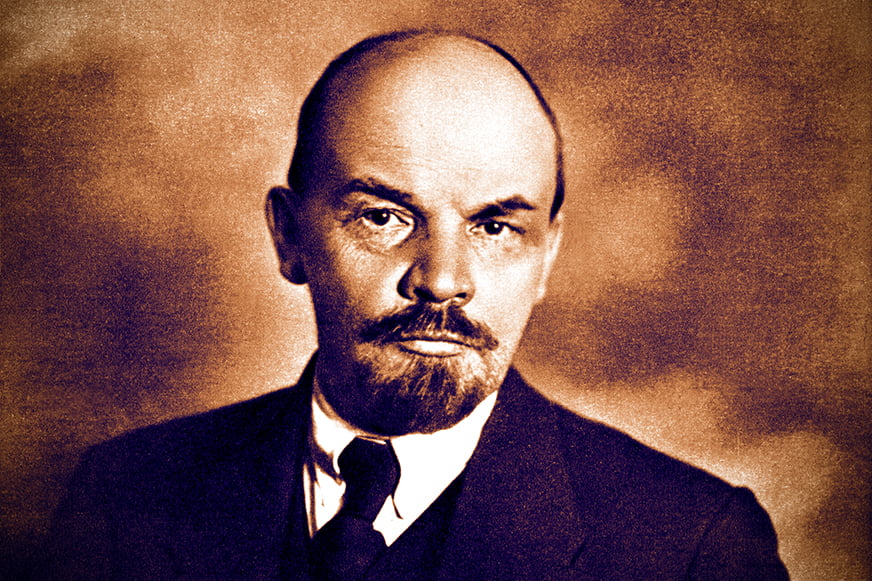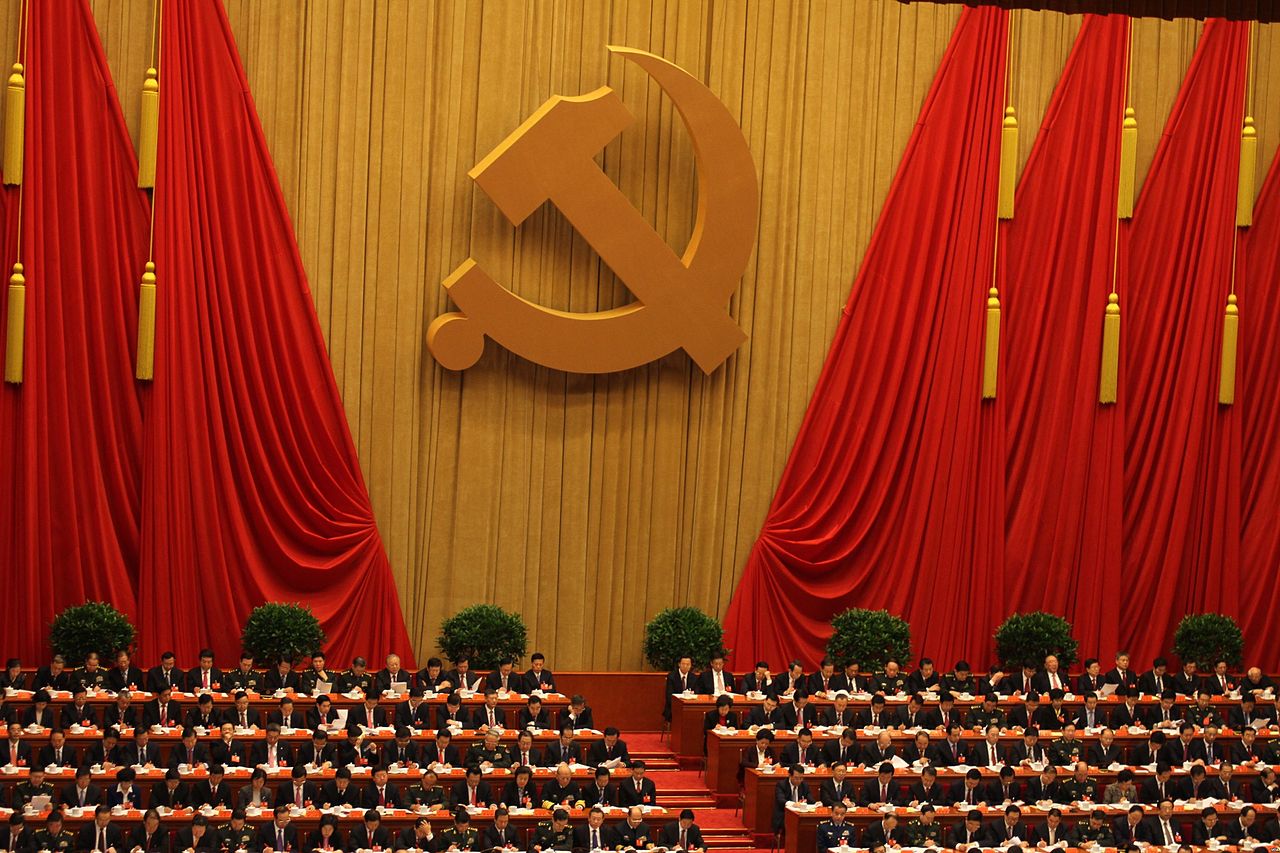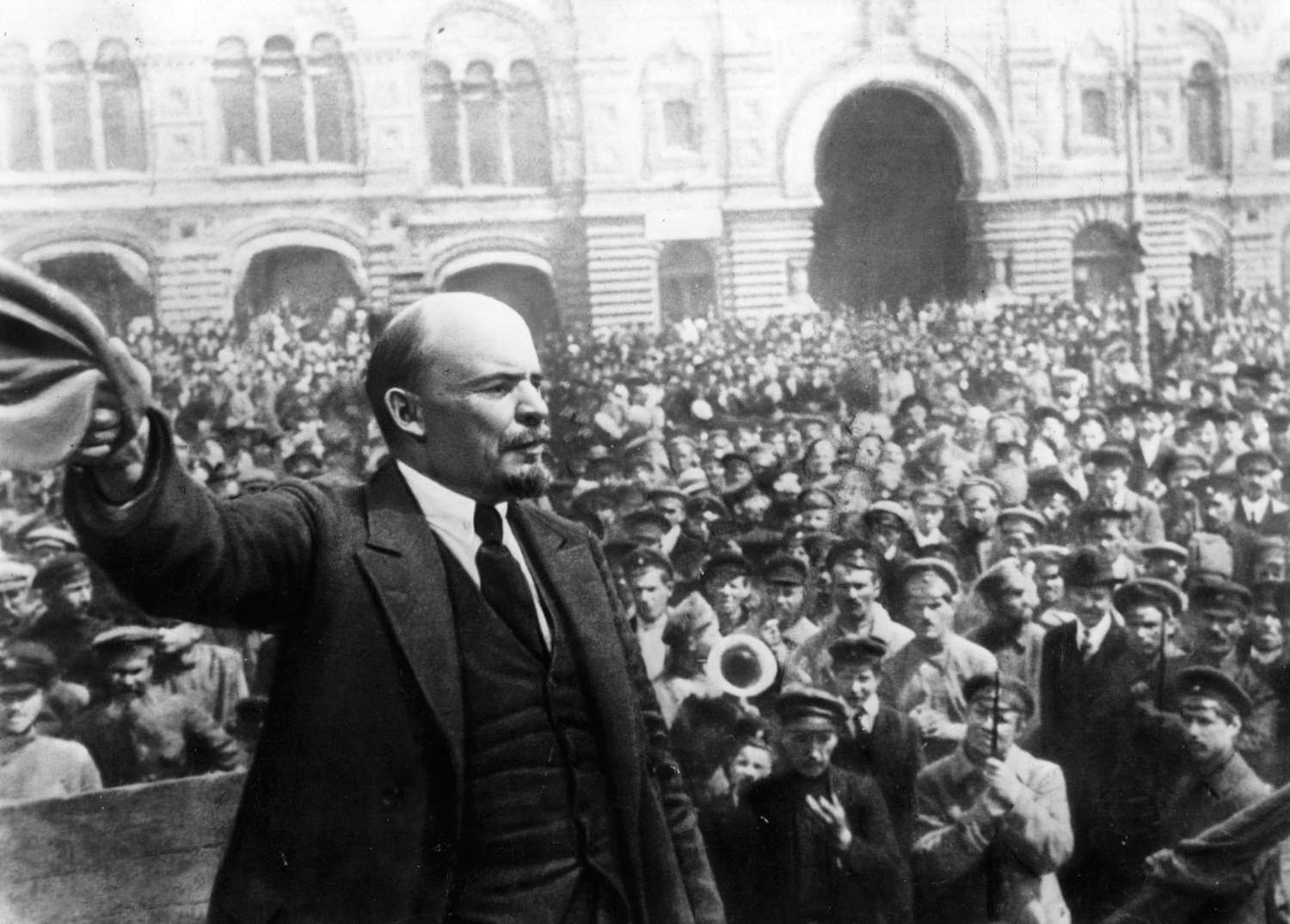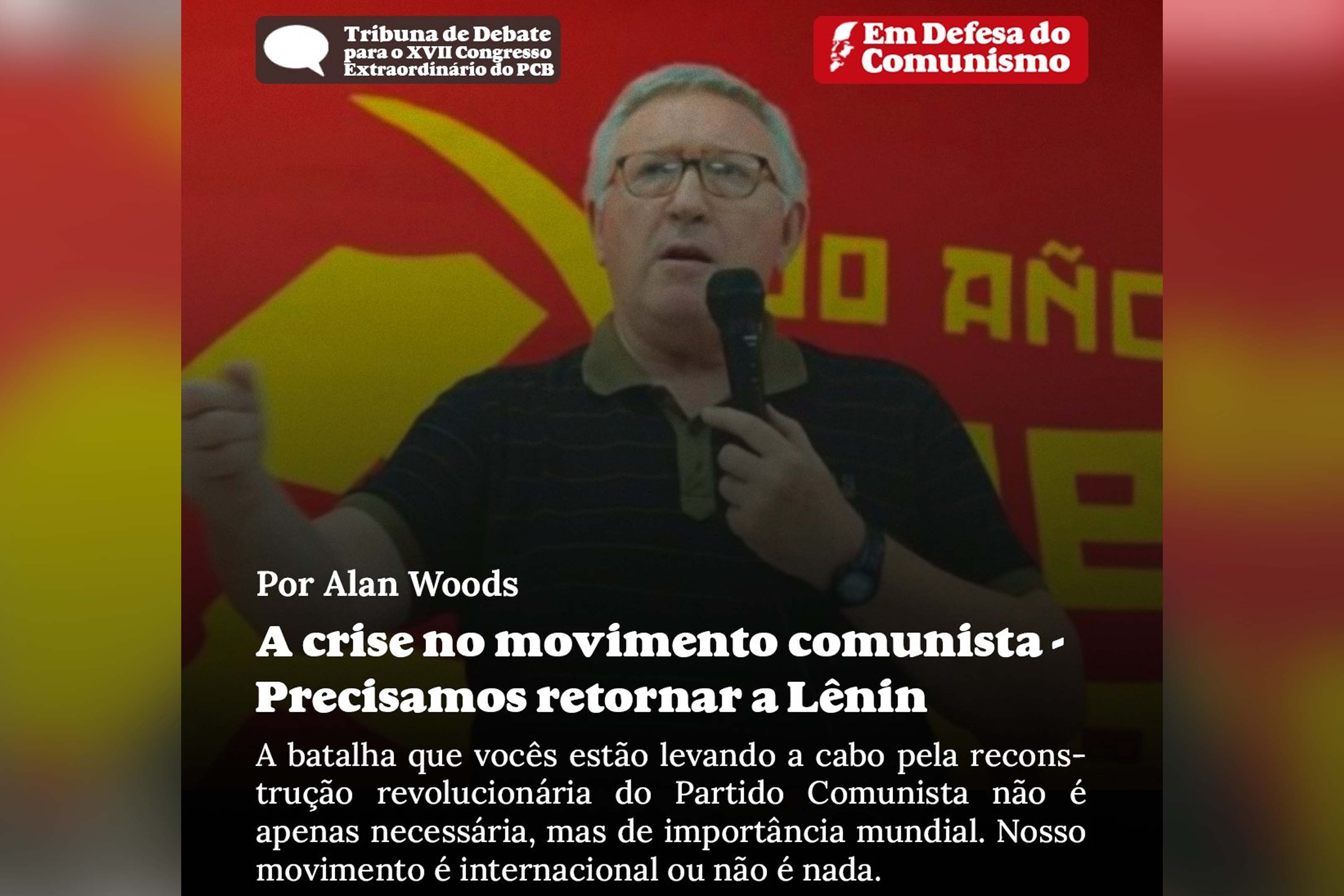We publish here a contribution by Alan Woods to the pre-congress debate of the Brazilian Communist Party – Revolutionary Refoundation. The PCB-RR gathers the comrades who were bureaucratically expelled from the PCB in July – August 2023, after they raised a whole number of political differences, including regarding the question of the character of the war in Ukraine. We would like to thank the Provisional Political Committee of the PCB-RR for the opportunity for this exchange of ideas amongst Communists and we wish them success in their congress, which is taking place at the end of the month.
The article was published as part of the Preparatory Debates for the PCB-RR congress with the following introduction:
Editors’ note
On the basis of bilateral contacts and meetings held since the second half of 2023 between members of the PCB-RR provisional NPC (National Political Committee) and leaders of some revolutionary left organisations, interested in maintaining a dialogue with us and aiming at the possibility of unity of action on some issues, an invitation was formalised for these organisations to contribute articles to the Tribuna de Debates (Debates Platform) section of the In Defense of Communism portal.
In this context, we publish the following contribution, entitled, "The crisis in the communist movement – We need to go back to Lenin", written by Alan Woods, from the International Marxist Tendency (IMT), of which the Internationalist Communist Organisation (OCI) is a part. We also extend the invitation to Coletivo Cem Flores and the Movimento Marxista 5 de Maio (MM5) so that they can also share their perspectives through articles on our platform, with our Tribuna remaining available for future contributions.
First of all, I would like to thank the comrades of the PCB-RR for the opportunity to participate in their pre-congress discussions through this Tribune of Debate. Political discussion and clarification are essential if we are to advance.
15 years ago, the IMT commenced fraternal relations with the PCB and particularly with its then general secretary, comrade Pinheiro, with whom I had very cordial and constructive conversations.
I visited the party on several occasions and met with its CC. This led in 2014 to joint work between the IMT and the PCB in solidarity with the anti-fascist resistance in Ukraine.
I am pleased to see that these links have now been re-established with the comrades fighting for the revolutionary reconstruction of the PCB.
The battle you are waging for the revolutionary reconstruction of the Communist Party is not only necessary, but of world significance. Our movement is international or it is nothing.
It is necessary for the forces of genuine communism, those who stand for class independence, against imperialism and for socialist revolution, not only in words but also in deeds, to engage in a debate of ideas as well as in practical collaboration.
It is the duty of communists everywhere to follow with attention the debates taking place, to learn from them and to contribute to them. Above all else, it is necessary to strive continuously for political clarity.
Lenin explained long ago, without revolutionary theory there can be no revolutionary movement. The free discussion of ideas and differences was one of the main characteristics of the Bolshevik Party throughout its history. The party requires it as the human body requires oxygen.
 It is our duty to return to the clean traditions of Leninism / Image: public domain
It is our duty to return to the clean traditions of Leninism / Image: public domain
The dead hand of Stalinism destroyed the internal democracy that characterised Lenin’s party and smothered all internal debate.
This was what destroyed the Communist International. It is our duty to return to the clean traditions of Leninism and revive the spirit of Bolshevism and proletarian internationalism.
The discussion in the world communist movement was long overdue. It is taking place at a crucial turning point in world history.
The capitalist system finds itself in an unprecedented crisis. The present crisis is not a normal cyclical crisis of capitalism. It is a clear indication that capitalism has reached its limits and is no longer capable of playing any progressive role.
The crisis finds its expression in chronic instability in every sphere: economic, financial, social, political, diplomatic and military.
Millions are faced with a slow death by starvation, squeezed by the remorseless grip of the imperialist moneylenders.
Even in the most advanced and wealthiest countries, the working class finds itself faced with merciless attacks on its living standards and democratic rights.
The strategists of capital offer no solution to the crisis. All the conquests of the past are now under attack: pensions, healthcare, education.
All the attempts of the bourgeois to restore the economic equilibrium merely serve to destroy the social and political equilibrium.
The conditions are ripening for an explosion of the class struggle on an international scale.
The crisis of capitalism is also a crisis of reformism. Long gone is the period in which the labour movement was able to win serious and lasting concessions from the ruling class.
After the 2008 crisis there was a worldwide revolt against austerity measures. The first expression of radicalisation was a swing in the direction of ‘left reformism’ in different countries.
We saw the rise of Syriza in Greece, Podemos in Spain, Bernie Sanders in the United States, and Jeremy Corbyn in Britain.
However, experience has cruelly exposed the limitations of left reformism. They aroused enormous expectations, enormous hopes, only for them to be dashed in every single case.
The left reformists have always capitulated in the moment of truth. Betrayal is inherent in reformism.
As a result of those betrayals, today we see a whole layer of the youth turning towards the ideas of communism.
This trend is clearly revealed in opinion polls in one country after another – including the USA itself.
This is an extremely important phenomenon. The most advanced layers of the youth call themselves communists. They have a passionate desire to fight for a better society and a thirst for ideas.
Yet, paradoxically, precisely at this moment the world communist movement is in complete disarray. Many of today’s Communist Parties are ‘communist’ in name only.
The leaders of those parties long ago abandoned the ideas of Lenin and Bolshevism and collapsed into vulgar reformism. Rather than socialist revolution they stand for the reform of capitalism and have succumbed to social-chauvinism.
The mighty Italian Communist Party (PCI) used to be the biggest and most powerful in Europe. The policies of national-reformist degeneration led in the end to the dissolution of the PCI and its transformation into a bourgeois reformist party.
The Spanish Communist Party (PCE) is part of a coalition government that is sending arms to Ukraine as part of NATO’s war against Russia. When its youth wing (UJCE) rejected the official line, they were expelled.
The Communist Party of the United States (CPUSA) is little more than an election machine for the capitalist Democratic Party, calling for a vote for Biden as a ‘vote against fascism’.
The South African Communist Party had a Menshevik approach during the struggle against apartheid. It established a clear-cut and completely artificial separation between a ‘national democratic revolution’ and a socialist revolution in the far distant future.
It has been part of the pro-capitalist ANC government for 30 years, and even defended the massacre of 34 striking miners at Marikana in 2012 by the forces of the capitalist state.
The Chinese Communist Party is neither Communist nor a Party, but merely an arm of the capitalist state, defending capitalist property relations at home and the imperialist interests of the Chinese capitalists abroad.
And so the list goes on…
 The Chinese Communist Party is neither Communist nor a Party / Image: Dong Fang, Wikimedia Commons
The Chinese Communist Party is neither Communist nor a Party / Image: Dong Fang, Wikimedia Commons
The question of war is a litmus test for all tendencies in the workers’ movement. The war in Ukraine and the Israeli assault on Gaza have brought to the fore the complete bankruptcy of many of these so-called Communist Parties.
The invasion of Ukraine by Russia in February 2022 brought the deep crisis in the Communist movement to the fore, with most Communist Parties scandalously making concessions to the position of their own ruling class.
Many Communist Parties in the West gave open or tacit support to NATO, covering their capitulation with abstract appeals for peace, ‘negotiations’, etc.
Equally bad, other parties have become little more than instruments of Russian and Chinese foreign policy, presenting these capitalist countries as ‘progressive allies’ of the struggle of weak and dependent nations to “break free of imperialist colonisation and debt slavery”.
The Communist Party of the Russian Federation (CPRF) has become a cheerleader of the Putin regime, which represents the interests of the Russian capitalist oligarchs and their ambitions on the international scene.
Faced with the massacre in Gaza, many Communist Parties across the world, instead of defending a clear revolutionary anti-imperialist policy, have responded with pious appeals to ‘respect international law’ and the resolutions of the United Nations.
Nothing could be further away from Lenin, who denounced the League of Nations as an ‘imperialist thieves' kitchen’. ‘International law’ is a farce, merely a reflection of the given balance of forces between the main imperialist powers.
During World War One, Lenin was particularly scathing in his criticism of pacifism. His basic position was that war was the inevitable result of imperialism and that an imperialist peace was just the preparation for another imperialist war.
He insisted that the only consistent way to fight imperialist war was through socialist revolution and that the main enemy of the working class was at home.
These contradictions have led to a series of splits. The International Meeting of Communist and Worker Parties (IMCWP) in Havana in 2023 failed to even produce a statement on the Ukraine War as it could not find ‘consensus’.
The problems in the Communist movement are not new. They can be traced back to the acceptance of the anti-Marxist policy of ‘socialism in one country’ in the late 1920s.
In 1928, Leon Trotsky predicted that this would inevitably lead to the national-reformist degeneration of every Communist Party in the world. This prediction proved to be correct.
At first, the leaders of the Communist Parties obediently carried out the dictates of Stalin and the bureaucracy, slavishly following every twist and turn that came from Moscow, from the ultra-leftism of the ‘Third Period’ to the Menshevik policy of the ‘popular front’ alliances with the Liberals.
They later repudiated Stalin, but instead of returning to Lenin, they made a sharp turn to the right, particularly under the guise of ‘euro-communism’.
They became mere social democrats, in some cases maintaining the word Communist in their names, in others ditching it as if it were a dirty old rag. In breaking from Moscow these parties adopted reformist perspectives and policies.
Following the fatal logic of ‘socialism in one country’, the leadership of every national party adapted themselves to the interests of the bourgeoisie of their own country. This led to the complete degeneration and, in many cases, the total liquidation of the Communist Parties.
Many rank-and-file communist workers have reacted against this shameless revisionism. The bureaucratic expulsions and violation of democratic rules in the Brazilian Communist Party (PCB) are part of this process.
Amongst the parties which have not capitulated to national-chauvinism, the Greek Communist Party (KKE) stands out.
This is a party comprising tens of thousands of the best workers and youth in Greece, which has undoubtedly taken important steps in rejecting the old discredited Stalinist-Menshevik idea of two stages and openly stands for socialist revolution.
It adopted a clear internationalist stance on the Ukrainian war, which it correctly characterises as an inter-imperialist conflict, by opposing its own ruling class and NATO, but also denouncing the imperialist character of Putin’s regime.
We have differences with the KKE. In particular, we think that it is necessary to break completely from the anti-Marxist theory of socialism in one country and to adopt a Leninist approach to the question of the united front.
The KKE also took the initiative to convene the International Meeting of Worker and Communist Parties, as an attempt to reorganise the communist movement after the collapse of the USSR.
There is a clear need to reorganise the communist movement internationally. The problem with these meetings is that they are based on ‘consensus’ as opposed to debate, confrontation of ideas and democratic centralism.
The limits of such an approach were revealed when wildly opposing points of view emerged regarding the war in Ukraine.
Fundamental questions of theory cannot be disguised by diplomatic joint statements, which avoid the main questions.
Some parties put their name to resolutions talking of workers’ power and the struggle for socialism at international gatherings… while at the same time conducting a thoroughly reformist policy back at home.
In some cases, militants who are repelled by the reformist policies of the leadership of many Communist Parties have gravitated towards the figure of Stalin. This is understandable, but wrong.
A cursory examination of Stalin’s policies reveals that they represent a fundamental break with Lenin and Leninism.
 Lenin firmly defended a policy of no confidence in bourgeois liberals and the need for the working class to take power / Image: public domain
Lenin firmly defended a policy of no confidence in bourgeois liberals and the need for the working class to take power / Image: public domain
Where Lenin firmly defended a policy of no confidence in bourgeois liberals and the need for the working class to take power, Stalin brought back the Menshevik ‘two-stage’ theory of alliance with the ‘progressive bourgeoisie’, which led to disaster in China, Spain and elsewhere.
Lenin opposed “international institutions” like the League of Nations, which he described as a “thieves’ kitchen”, but Stalin brought the USSR into the League of Nations in 1934.
Where Lenin advocated proletarian internationalism, Stalin courted the different imperialist powers, and then disbanded the Communist International in May 1943 as a gesture of goodwill towards them.
The bureaucratic methods that the leadership of many Communist Parties have used to eliminate their critics come straight from the anti-democratic rulebook of Stalinism and have nothing to do with the clean banner of Leninist democratic centralism.
As long as Lenin was alive, debate thrived within the Communist International and the Russian Party on many different questions: the Brest-Litovsk negotiations, the trade union question, the New Economic Policy, the United Front, participation of Communists in parliament and trade unions, etc. That made the Party and the International stronger, not the opposite.
It is of fundamental importance for all communists to examine these questions carefully. They are not of merely historical interest.
On the contrary, they are extremely relevant to the discussions taking place today among Communist Parties about imperialism and war, the character of Russia and China, the role of the BRICS, and the idea of a so-called “multipolar” world.
Of course, some will say: “but you are Trotskyists!” To this we reply: we are Marxists and we are Bolshevik- Leninists. We defend the ideas and traditions of Trotsky because he alone fought to defend the ideas and traditions of Lenin against the Stalinist reaction.
On all the fundamental questions (working-class independence, opposing collaboration with the bourgeoisie, proletarian internationalism, and a democratic centralist form of organisation) there was no difference between Lenin and Trotsky after 1917.
Unfortunately, many who call themselves ‘Trotskyists’ have discredited the name in the eyes of communists. Suffice it to say that those sectarians have just as little to do with the genuine ideas of Leon Trotsky as the Stalinists have in common with those of Lenin.
This is the case for instance with the so-called ‘Fourth International’, whose scandalous slogan is “sanctions on Russia, weapons for Ukraine”. This places them firmly in the camp of NATO imperialism and de facto on the same side as their own ruling class.
We have absolutely nothing in common with such people. The truth is that after the assassination of Trotsky in 1940, the Fourth International ended up as an abortion. It is now not even a footnote to history.
When Trotsky launched the International Left Opposition, he envisaged it as the left opposition in the Communist Parties. We are genuine communists – Bolshevik-Leninists – who were bureaucratically excluded from the ranks of the communist movement by Stalin.
We have always fought to maintain the red banner of October and genuine Leninism, and now we must reclaim our rightful place as an integral part of the world communist movement.
The time has come to open an honest discussion in the movement about the past, which will finally break with the last remnants of Stalinism and prepare the ground for lasting communist unity on the solid foundations of Leninism.
We are now faced with a situation in which a whole layer of youth is instinctively looking for the banner of communism. The situation has never been more favourable to conquer these new layers for the cause of communism.
But in order to succeed, we need a fresh start: a clean banner with a clear and unambiguous revolutionary and communist identity.
To this end, the International Marxist Tendency is launching a new Revolutionary Communist International in June this year, which we see as a step in the direction of the rebuilding of a mass Communist International worthy of the name.
We extend a hand of friendship to all honest militants who wish to fight for communism. All we have to offer are our ideas, which can be found in our published Manifesto.
This is our contribution to an honest and fraternal discussion. The result of this will be entirely in your hands.
For our part, we earnestly hope that it can eventually lead to a lasting unification of all genuine forces on the solid basis of the ideas of Lenin, Bolshevism and the great October Revolution.
Comrades! Let us join hands in a common fight against revisionism and return to the ideas and methods of Lenin!
Let our slogans be:
Down with revisionism!
Back to Lenin!
For the fighting unity of all communists!
Forward to the rebuilding of the Communist International!
We look forward to your comments on these important questions.
London, 9th April, 2024
